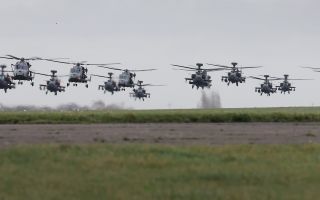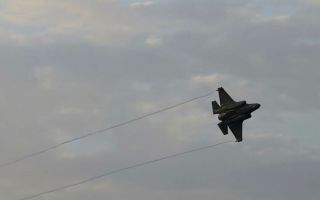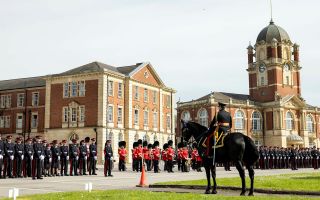Tri-Service
Comment: The UK Election And Foreign Policy...
The UK election and foreign policy? Now there’s a sentence we haven’t seen very often this year. If the sentence were a word it would be an oxymoron.
Outside of the sceptered isle the Russian bear is growling, large parts of the Middle East are in chaos, Iran may yet still be on the road to a nuclear weapon, hundreds of thousands of people continue to flee poverty stricken countries, seeking Europe, and the future of the Euro is in question.
The UK is a middle ranking power, a nuclear-armed state, and has a place on the UN Security Council.
And yet, inside the green and pleasant land the election campaign for who leads this powerful force in the world has barely mentioned events beyond its shores.
Neither of the potential governing parties have committed to maintaining the 2% of GDP on defence spending as required by a (non binding) NATO agreement for membership
David Cameron’s Conservative led government has been more or less absent on the world stage for at least two years. It was not even present at the Minsk talks on Ukraine leaving France and Germany to have by far the most influential voice from the West European side. The French are far more engaged in the Middle East conflicts especially in Syria, Yemen, and Israel/Palestine.
This all comes at a time when the USA is attempting to engage less in European security and the White House prefers to ‘lead from behind’ in the Middle East.
In the election campaign what passed occasionally for foreign policy ‘debate’ was about the possibility of a referendum on EU membership, and on levels of immigration. Tony Blair made a brief intervention arguing that the EU guarantees the UK its largest market. Labour leader Ed Miliband took a cheap shot at Cameron suggesting he was responsible for the chaos in Libya and by association for the drowning of thousands of migrants. On both occasions a distracted media and political class quickly moved on.
The issues will not go away and foreign policy will soon enough be back, snapping away, and sometimes biting at our attention.
As well as ‘events’ which will require action, there are big decisions to be made, several of which within the first year of the next government.
For example, the defence expenditure needs to be nailed down yet both major parties have gone into Election Day without really telling the electorate what their plans are.
The Conservatives have said they will finish building, and deploy, both of the two aircraft carriers currently under construction, reversing an earlier decision to mothball one. Labour’s definitive plan for the second carrier is uncertain.
Whichever flavour government the British get will have to make a fairly quick decision on whether the ageing Trident submarine nuclear deterrent is to be replaced, and if so, in what manner.
The coalition Government of the last five years kept kicking the can down the road but the decision has to be made and will form part of the negotiations, if as expected another coalition government is to be formed.
The Labour Party appears to favour a cost cutting replacement, possibly going down from four submarines to three which many analysts believe will impair the ability to maintain a 365 day a year patrol presence. The Scottish National Party wants to scrap Trident, but if it engages in some sort of voting agreement with Labour it could be bought off with promises that the two aircraft carriers are maintained at a Scottish port, presumably until independence. The Liberal Democrats would also support a reduced submarine package.
If David Cameron returns as Prime Minister he will want to replace Trident with four new submarines. The question will be a major part of any negotiations about the make up of a coalition government, which are expected to begin on Friday morning.
Behind all this lies the possibility of Scottish independence. Last year’s referendum may have decided in favour of maintaining unity, but the genie is out of the bottle.
Trident and the two carriers are at the heart of British military strategy. So is Scotland. So long as Scotland is in the union, a foreign power cannot seek to influence the northern part of the UK.
It might seem fanciful in 2015 to talk of foreign powers threatening England via Scotland, but in the great sweep of history it is conceivable.
A more pressing issue concerning Scottish independence would be the loss of the Royal Navy and Royal Air Force bases which currently guard the approaches to the UK from the north, or to be more specific from the Russian.
All the above issues should have played a part in the debate of who gets to run the world’s 5th largest economy, but the storm clouds were ignored, and the distant rumble of threats beyond the island drowned out by an election campaign, which deliberately ignored foreign policy, preferring not to have to be clear on questions which need answers.
Tim Marshall was formerly the Diplomatic Editor at Sky News. He can now be found at The What and the Why









